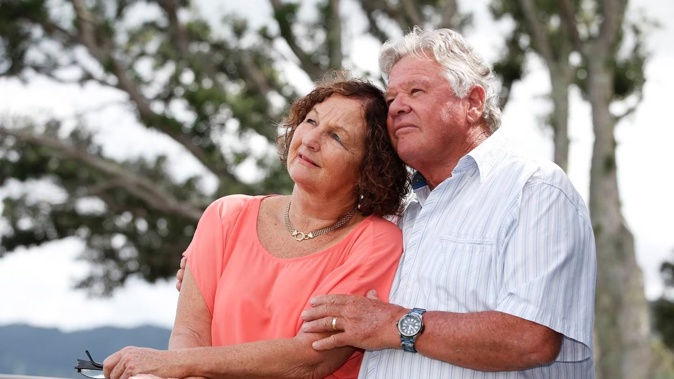
A Northland couple whose daughter was killed when a car rolled onto her tent say they’ve finally been listened to after a Coroner’s report raised concerns about the police investigation.
Natasha Roys, 43, died early on January 1, 2020, at a property at Tokerau Beach on the Karikari Peninsula.
The Northpower technician from Whangārei had been celebrating the New Year with friends and went to sleep about 1.30am in a tent she had pitched near the bottom of a sloping section.
According to the Coroner, one of the other attendees, who had been drinking, drove his Suzuki Escudo to the beach with others around 1.30-2am. When he returned he parked the vehicle at the top of the slope and went to bed about 2.30am.
The following morning the Suzuki was found against the fence at the bottom of the property and Roys was unresponsive. She was confirmed dead by paramedics.
What followed was a three-year nightmare for her parents, Jenny and Trevor Roys of Whangārei Heads, who said they had not only lost a loved daughter but were also subjected to “lie after lie” during the police investigation.
“We felt like he [the initial investigating officer] thought our daughter’s life was worth nothing,” Jenny Roys said.
Now, however, a report by Coroner Tania Tetitaha has backed up many of the couple’s concerns.
Her report details shortcomings in the police investigation, lays out contradictory evidence about the state of the Suzuki’s handbrake, and makes a series of recommendations should anyone else die in an incident involving a vehicle on private property.
The couple had earlier told the Advocate they were unable to grieve because of the way they had been treated in the months after their daughter’s death.
“Now someone has finally listened to us and they’ve not made us feel like liars. It has helped us very much,” a tearful Jenny Roys said.
Both the Coroner and a detective assigned to the case some six months later had done “an amazing job”.
“They went into bat for us, the little person. The detective did what he could, but things weren’t done properly in the first place,” she said.
No one has been charged over Natasha Roys’ death, though the Coroner’s report reveals police sought legal advice about laying criminal charges.
It appeared they decided not to go ahead with charges because they couldn’t prove the car owner had committed an unlawful act, and because mechanical fault was involved but the car had a current Warrant of Fitness (WOF).
In a police statement given that morning, the Suzuki owner himself raised doubts about the handbrake.
“Mechanically I know that my handbrake is not the best. It does work but I have been told that my handbrake needs work,” he said.
He believed the handbrake was on but pressure on the brakes may have caused the vehicle to creep downhill before it gathered momentum.
The car owner later refused to be re-interviewed on the grounds he had already given a statement.
Natasha Roys was 43 when she was killed by a vehicle that rolled down a slope and struck her tent. Photo / Michael Cunningham
Tetitaha said police had asked several experts to give evidence about the state of the vehicle but they offered conflicting views.
An inspection by VTNZ found a number of brake faults, including “excessive travel” of the handbrake, but that was contradicted by the garage that issued the WOF.
The garage did, however, suggest the bigger, off-road tyres fitted after the WOF was issued may have increased brake wear. The vehicle had also been modified since the WOF with a suspension lifting kit.
However, the company that installed the lift kit said none of the braking systems had to be touched to fit it.
The Coroner also considered the possibility that the driver had failed to set the handbrake, though he maintained it was set and no witnesses had disputed that.
/cloudfront-ap-southeast-2.images.arcpublishing.com/nzme/SECS2AWNMVBY3IWJZL7K4NNJIE.jpg)
Police at the Tokerau Beach property on New Year’s Day 2020. Photo / TVNZ
Concluding her report, Tetitaha said she was concerned about the sufficiency of the police investigation, in particular that no report was produced by experts from the police Serious Crash Unit (SCU).
For reasons unknown, the SCU was initially called by the officer in charge but then stood down, she said.
While the SCU usually dealt with crashes on public roads, their “unique skills” would have been a great help. Without a specialist crash report she was unable to make specific findings.
“An SCU report would have provided transparency regarding the circumstances that have led to this death and how similar deaths may be prevented in future,” she said.
Tetitaha made a series of recommendations, in particular that police consider instructing the SCU to produce reports on all deaths involving a vehicle, whether on public roads or private property.
Jenny Roys with her “bright and cheery” daughter Natasha Roys. Photo / Supplied
A report produced earlier by the police, prompted by family concerns, also found shortcomings in the investigation.
They included failing to involve the SCU; failing to follow up on statements by the car owner about the state of the handbrake; failing to obtain witness statements from all attendees; failing to take photos of the Suzuki’s interior; and failing to seek help when the incident grew beyond the attending officer’s capacity.
Jenny Roys said she and her husband felt they had let their daughter down because, despite their efforts, no one had been held to account over her death.
“I wouldn’t wish my worst enemy to go through this. It was three years ago but it still feels like it was yesterday. She may have been in her 40s but she was still our girl.”
Police have since amended their traffic crash policy and now require an SCU analyst to attend any death on private property caused by or involving a motor vehicle. The change came into effect in May 2022.
Police have been asked for comment.
Take your Radio, Podcasts and Music with you

/cloudfront-ap-southeast-2.images.arcpublishing.com/nzme/GRWJ5D3C6RHQDLHCPQPJVZZ3FM.JPG)
/cloudfront-ap-southeast-2.images.arcpublishing.com/nzme/FUJNZPGN4NEA5PJ6LN3RGIT6GM.JPG)








